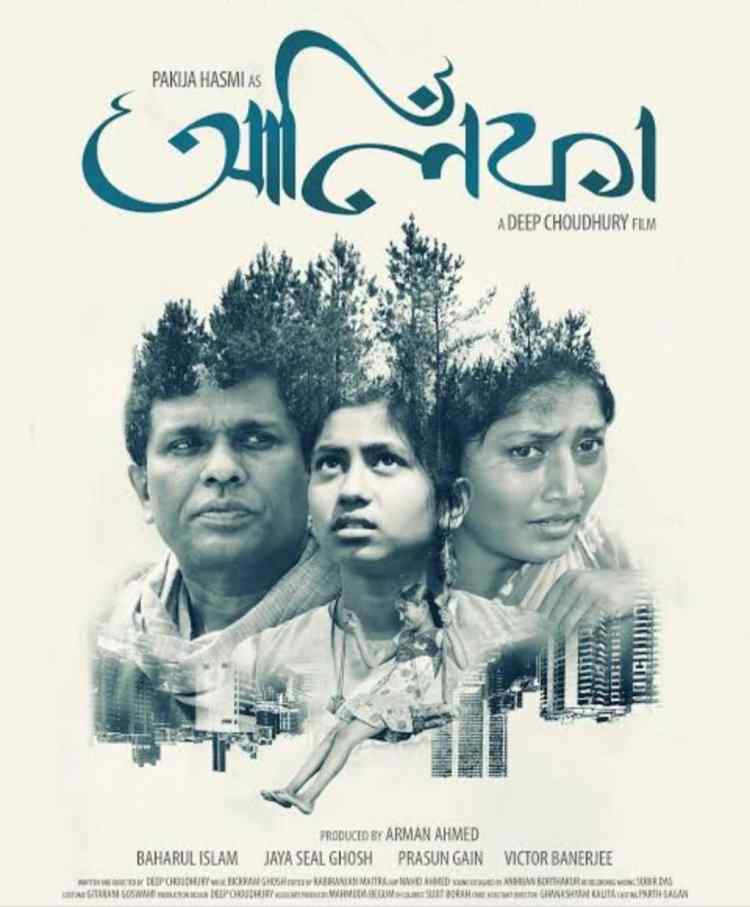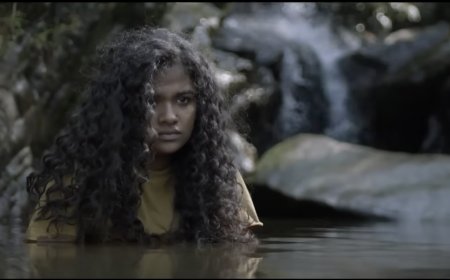‘Alifa’ Review – Life Entangled In Conflicts Of Nature And The Politics Of Living
‘Alifa’ Review – Life Entangled In Conflicts Of Nature And The Politics Of Living

Alifa, directed by Deep Choudhury, is a gritty portrayal of frail human conditions, emotions, and wants against the backdrop of a human-nature conflict. Exploring the plight of migrant workers in the current urban setting, Alifa presents a sombre perspective on human life,, their struggles, hope and everything that keeps our life going. It deals on issues and topics that infrequently make it to the big screen here, such as the problem of migrants in Assam, the vulnerability of daily wage workers, etc. Filmed in Assamese and the Mymensinghiya dialect, the movie is an honest depiction of how difficult it is to lead a fulfilling life. It sheds light on how people migrate to cities after losing their homes to overflowing rivers and begin living illegally by clearing forest lands with the assistance of small-time corrupt forest officials. As a consequence, the socio-political and natural conflict that follows upends the lives of these people and their families. Alifa mirrors the ongoing struggles over illegal immigration, encroachment, and land rights policy in Assam.
Addressing the haunting reality of our times amidst an ecological narrative, Alifa follows the subaltern lives of Ali and Fatima and their children. The first prime character we are introduced to is Alifa, an innocent portrayal by Pakija Hasmi as she stares at the view of the sprawling city from the Naraksura hills of Guwahati. They were forced from their land by the overflowing Beki river, a tributary of the Brahmaputra, and now they reside here. Alifa, who is caught up in her own reflections on life while remembering some of her father's statements, is jolted out of her reverie when her brother teases her and the two of them playfully disappear into the foreboding curves of the landscape, carefree and unconcerned about what lies ahead. They spend their day gathering wood and water and the majority of the time exploring the wilderness of the hills.
On the other side, Ali, their father is grappling with their tragedy of being poor who is unable to send his daughter to the school, nor able to satisfyingly honor his love for Fatima. On the other side, Ali, their father is grappling with their tragedy of being poor who is unable to send his daughter to the school, nor able to satisfyingly honor his love for Fatima. He is also entangled in the politics of living - enduring constant humiliation for his socio-economic and religious background, selling his labour and paying a demanding sum for each day of their miserable life to a nasty and foul-mouthed forest official (played by Pabitra Rabha) who otherwise would evict them out of their illegal shelter, etc. Baharul Islam as Ali owns the part in the sense that he conveniently slips into the shoes of the invisible beings that we frequently encounter in the morning - stranded at a specific corner of the street - in the hopes that someone will engage them for the day.
Jaya Seal as Fatima too contributes effectively to her part of a construction site worker who is somehow caught up in an extra-marital relationship. Living life at its worst, this is perhaps an escape route for Fatima to seek some pleasure out of life. Fatima will undoubtedly have to deal with the fallout from her actions later, but few people would be not willing to accept this. It is clear that writer-director Deep Choudhury intends to show people as flawed and innocent, but such situations may leave viewers with the wrong impression and can sometimes have a negative take away for the them.
Even if life may seem challenging, we shouldn't let our morals and principles slip; but again maybe we haven’t gone down to such existential crisis and we are yet to fully figure out life.
If the problems of this family were not already enough, nature plays the next trick on them (again!). With a wild leopard on prowl, the lives of these people (and many other families like Ali’s) come under the terror of an uncompromisable threat. This time their survival is gravely at risk and in this attack by nature creating havoc against their fragile and pitiful lives it tries to ensure that everyone bites the dust. For the abuse of nature someone has to pay the price one day! But it is poor little Alifa who comes under the attack of the man eater one night and sacrifices her life.
Deep Choudhury’s Alifa is the resemblance of a Hobbesian state of nature where life is nasty, brutish and short. Ali, Fatima, Alifa and Faisal (Alifa’s brother) struggles in this life outside society. It is not a struggle for creating their own destiny but a fight for their survival and in this battle against time they are just trying to survive another day. Alifa and her brother’s desire to attend school, Ali’s want for some dignity and respect and Fatima’s wish for some marital happiness – every dream, hope and aspirations of these people are given up just so as to go through the plights of another day. Cinematographer Nahid Ahmed does a great job of plunging us into this universe as the film is largely shot on location. Nature is shown at its darkest as it appears sucked out of all its greenery. Editor Rabiranjan Maitra is also to be given credit here. The sense of a constant threat and uneasiness looming over resides in every frame and the music by Bickram Ghosh helps contribute to this. Alifa is also a commentary on urban poverty, politics of the state, human-nature conflict, social exclusion and marginalization of the Miya Muslims and illegal encroachments to name a few and Deep Choudhury’s take on these issues is unapologetically real.
To conclude, Alifa is not simply haunting but it's also painful. After the tragic death of Alifa we feel the burden of her mourning parents and the guilt that both of them carry within. The movie closes with Faisal moving swiftly into the jungle with a bow and arrows seeking to challenge the unknown and the unseen in order to avenge his sister’s death. The angst is real. But who is to blame for her demise? The movie raises a lot of questions, but it never provides an answer or goes down the intellectual path of defining the right and wrong. We only need to watch the film, experience the characters, embrace the situations, comprehend the silence, and come up with our own answers. Alifa succeeds because not many movies do that these days. It finds its charm in the silences that appeal straight to our minds. Being unabashedly depressing and silently haunting, the direction let the silences absorb us completely.
Alifa also won the Best Debut Film of a Director Award in the 64th National Film Awards, the Best Film on National Integration in the 7th Assam State Film Awards and a couple of other awards.
What's Your Reaction?

































































